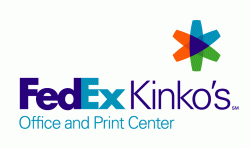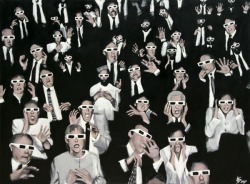Hey everyone. Sorry for the lack of updates. Been a rough week house/dog sitting for my sister, having the girlfriend in town, and working very hard on a project that I will soon post here on Buff's Blog.
A lot of good things are happening right now, and I'll soon be posting some details on each of them. In terms of blog updates, these next few days are a little crazy. Expect a post Monday 10/12 at around 8:00PM on some big developments in mobile marketing. Also, expect a blog post Wednesday afternoon outlining some information from a St. Louis Advertising Club event that I will be attending Tuesday at Avatar studios, a leading full-service production company in St. Louis (http://www.avatar-studios.com/) Lastly, expect a very cool multimedia presentation this Thursday in the Afternoon. I have been working hard on it for the past few days and am looking to have it done by Thursday morning. Can't say much about it yet, but I'll get it out to you guys soon. Thanks for stopping by, come back now. - Buffa
0 Comments
Have we lost all of our privacy as a result of living in the Internet Age? That could easily be debated. Finding out information about an individual is as easy as typing their name into google. Do I care? Not so much. In fact, I like having a personal brand on the web and I try to find ways in which people can reach me. So what's the problem? The problem is that I only really want certain people to reach me, and that is an issue that the internet really fails to take into consideration.
The other day I received a call from FedEx/Kinkos. It was a very nice lady who had printed a few resumes and cover letters for me last week. I wasn't able to answer, but she left a very nice message asking me how my interview went and in what ways she could help me in the future (in terms of printing services). This was probably one of the nicer things that a business has ever done for me. I mean, that's some very personal service right there. I just can't help but wonder...was that phone call a little too personal? Now I've seen this personal service in other ways and it's never really bothered me. I order protein supplements and vitamins from Bodybuilding.com. About a month after each order they send me an email saying something like "I'm sure you're running low on protein and vitamins, here's the deals that we have available for you." I mean that's pretty cool right? I think the difference lies in the medium of delivery: phone vs. email. I love the web. I communicate daily on the web. I build relationships through the web. The phone however, is and always will be (IMO), a much different story. I could talk to people on Twitter all day, people I don't know, people I want to know, or people I do know, and never get bored. If everyone of those people started calling me though, I'd get a little wierded out. I think that's where the generational difference comes into play between millennials and Boomers. My parents both prefer phone as a medium and very rarely give out email addresses. I however prefer email, facebook, twitter, and then the phone, something I don't think is very uncommon for my generation. In fact, I'm reading a lot of articles now about professionals simply putting their email address and Twitter handles on their business cards. Makes sense to me. This was just a spur of the moment thought but I'd like to hear from you. Have you had any "Kinko's" moments? Do you prefer the phone or the web? I'm all about social media so I would have to say I'm bias, but I believe we're in the Internet Age for a reason, and the phone as we know it may be on it's way out. Opinions from all ages are welcome. Also, if you're looking for the most innovative way to connect, one step beyond phone and email, check out my post on Google Wave, the newest communication platform from the guys and gals over at Google. Check that post here I just watched a Social Media conference online, specifically a session on "How to Grow Your Brand on Twitter," and it has left me feeling even more passionate about the platform and it's commercial marketing capabilities. Not to say I was nervous about my previous comments (I have had some backlash from anti-tweeters)but I do feel a lot more confident in knowing I am not the only firm believer in the importance and relevance of Twitter within the area of branding, marketing, and advertising. The conference focused on a panel of Twitter enthusiasts - a social media consultant forComcast, the man behind the Starbucks twitter account, a venture capitalist, and the social media/branding strategist behind Kogi BBQ, a Korean BBQ taco truck. The conference starts out with the most basic example of how something like Twitter can affect a commercial business and a brand. Kogi BBQ, an infamous Korean BBQ taco truck in Los Angeles, has used Twitter from the ground up to build its business. What started out as a few guys running into a club to sell a few tacos at Midnight has now turned into one of the most sought after franchises in West Hollywood. Basic operation? Post where the Taco Truck will be through social networks - let the fans flock. Let's put it this way, according to brand strategist Mike Presad, if the truck were to post it's location right now, within 30 minutes, there would be a line of at least 50 people waiting to get some food. Couple this with multiple trucks at multiple times a day, and were talking some serious return on (cheap) investment. While Kogi BBQ offers an innovative example of how next-gen businesses can capitalize on Twitter, it's some of the other brand perspectives that truly shine a light on the benefits of the platform. While I won't sit here and quote the findings, I'll give you some notes on what I would consider the most important aspects of the panel. 1. It's not strength in numbers, it's the strength in the relationships. 2. The authenticity of a brand is easily accessible on Twitter. 3. I'd love to hear your thoughts on the subject of Twitter. Is it like a parrot - smart and sweet, or more like a bald eagle - on it's way out with a few people (like me) trying to keep it around. Leave your comments in the replies. The video, if you're at all interested, can be seen below: I'v been stuck to the computer most of the day but I'd have to say it's been a pretty productive experience. It's amazing how much information you can find in the form of videos, podcasts (which I'm not sold on), blogs, Twitter Feeds, and Facebook posts. While the 2016 Olympic Voting took up most of my morning, it's a post in the early afternoon that really caught my attention.
In a a video titled "The Way Forward," Bob Greenberg and Barry Wacksman of digital agency R/GA discuss ways in which they are changing the framework of advertising - specifically digital. What are they doing different? They're not creating advertisements, rather they are creating useful things that advertise - most importantly, what they call platforms. People are reading and listening more than ever, however the digital landscape has changed the distribution channels. More people listen to music, but CD sales still decline. More people are reading, but magazine and newspaper are no longer the most prominent mediums. Television is still a huge part of society, but DVR, on demand, and online have changed when and what people watch. What does digital allow us to change? It allows us to change the way in which we place our media. It's no longer about what you buy, its about what you own. It's not about delivering a message to a target market, its about bringing that target market to you. How are the most successful agencies changing the landscape of advertising as we know it? They are focusing on platforms rather than campaigns. What is a campaign? At the most basic level, a campaign is something that comes and goes. It delivers a short-lived message to a consumer in an up and down cycle. What is a program? A program is designed to create ongoing relations with an audience or a consumer. Most often a program is created with the intention of rewarding loyal consumers. What is a platform? A platform is the future of digital and interactive advertising. A platform creates long-lasting interaction between brand and consumer. A unique application that often provides useful tools to an audience of individuals while also connecting them with the brand. Let's take a look at R/GA's example. Who's heard of Nike? Everyone. But not everyone has always been interested in purchasing a pair of Nike Running shoes. Campaigns have attracted the attention of consumers in the past, but a huge audience was still out there looking for ways to connect with the brand and the running lifestyle it promoted. A platform needed to be created to connect user and brand. What was the platform? Nike +. Nike + introduced a chip in Nike shoes that allowed users to track their runs on a computer. After you were done with a run, you could log onto your Nike + account and see all the statistics associated with the run. I'm sure everyone has heard of this. It's been around for about 3 years now. Results? Users have logged in over 160 million miles in 3 years. The average user logs onto the platform at least 3x a week. The product was a huge success. In 2008, R/GA took this to the next level. They hosted the largest race in World History. People could gather at one of the locations around the world, they could run in their backyard, or they could watch others run online. Individuals posted pictures, congratulated one another on message boards, and interacted with each other through different social networks. The platform brought the world together, and continues to do so to this day. We're at a time when advertisers shouldn't have to sell ideas to a client. Advertisers should be there to prescribe solutions. What does it boil down to? Talent. Finding individuals who can tell a story, think outside the box, systematically manage the execution of an idea, and do what's necessary to make it work. Advertising is an epidemic that makes some people sick. It's finally time to change that perspective. Let's go digital and find useful solutions that make the audience and consumer happy, healthy, and headed in the right direction. View the original video here. At around 37 minutes, it is long, but I strongly recommend it. Their presentation is great. I've finally figured it out. I'm not gonna lie though; I've had some help. After stumbling upon an article titled "The Age of Media Arts," the switch has finally been flipped. What's the profound discovery? Consumers have new demands. In fact, consumer isn't even always the right word to use when talking advertising. There's a new end-user now, and they're called an audience. What's the difference?
"A consumer is someone who intends to buy, and audience member is someone who has already paid the price of admission in some way and now, intends to be entertained." (David Burn - AdPulp) For those who've been following my blog, it's pretty obvious that I have a strong interest in marketing for the masses - social media, interactive, television, print, video, guerilla, and viral. I'm an advocate of attention-grabbing, call-to-action, information, communication, and education. I've never really thought of the thing I'm most interested in though and it's been right in front of my eyes this whole time: Entertainment. In his article on The Age of Media Arts, Lee Clow, Chairman and Chief Creative Officer of TBWA/Worldwide states, "We must stop talking about above the line/below the line and traditional/nontraditional and instead talk passionately about the ideas that invite people to our brands, wherever that may be." It's not a matter of "getting on Facebook" or "getting on Twitter" it's a matter of matching an audience, to a network, to a medium, to a message, to a creative idea. I'm a consumer who loves to find out about new brands. I'm also an audience member, and I am constantly looking to be entertained. My blog on "The Alumni Conspiracy" talked about finding ways that my high-school and college will stay connected with me. Send me videos, links, press releases, news feeds, etc. Entertain me. My blog on "Interactive Advertising" talked about grabbing my attention, educating, and informing me, but most importantly entertaining me. My blog on "The 4th Dimension" asked some of my favorite movie stars and bands to entertain me through videos and social networks. I could go on and on. These feelings aren't just mine though. I'm just one of the millions of consumers out there looking for ways to connect. Why do people like Gatorade ads, Nike ads, Apple ads, and Beer ads? Because millions of people buy into these products, own these products, and feel strongly about these products. These products don't need any more attention. They entertain through celebrity endorsements, sports promotions, visionary direction, and exciting execution. It's not as big of a risk for these companies because brand awareness is no longer their priority. They've moved on to bigger and better things now, and all they need to do is entertain. Just as Mr. Clow states, I think we're at a time where everything a brand creates doesn't have to fall under advertising. Sure, consumer-based advertising will always be around but the who knows what the future will bring? One thing is for sure though. The future will be about the blending of art and media in traditional and non-traditional ways and agencies will need to focus on finding ways to maintain, sustain, and most importantly, entertain consumers and audience members alike. The future is now, are you on board? |



 RSS Feed
RSS Feed